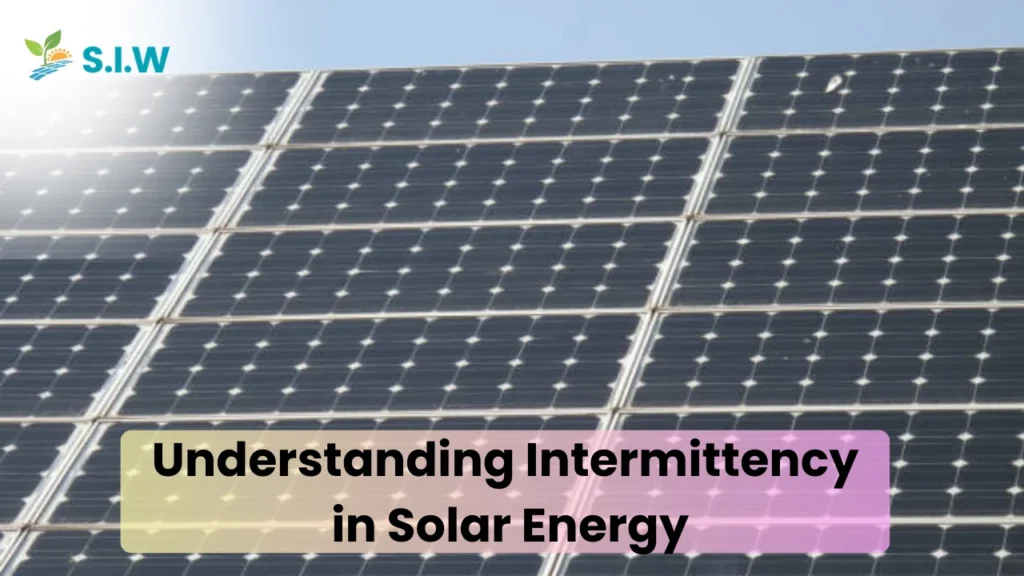Solar energy is a renewable energy source that relies on sunlight to generate power. However, unlike fossil fuels, which are available on demand, solar power depends on sunlight, which varies throughout the day and year. This variation creates a challenge known as “intermittency.”
What Causes Intermittency in Solar Power?
Intermittency occurs when solar power production fluctuates due to changing sunlight levels. For example, energy output drops at night or on cloudy days. This can be a problem because the power generated does not always match energy demand. Intermittency makes it hard for solar energy to serve as a consistent, standalone power source.
How Intermittency Affects Solar Energy Users
Intermittency can lead to inconsistent energy supply, which impacts solar energy users who rely solely on solar panels. This inconsistency may require backup energy solutions, such as battery storage or connections to the grid, to provide electricity when solar production drops.
Personal Experience: Planning for Intermittency
When installing a solar system, I quickly learned that planning for intermittent power was essential. My system came with a battery backup, ensuring power during cloudy days or after sunset. This backup proved invaluable, as it allowed me to continue using solar power when production was low.
Addressing Intermittency with Solar Batteries
One effective way to tackle intermittency is by using solar batteries, like the Tesla Powerwall 2, which stores excess power during sunny periods and releases it when needed. Batteries help manage solar energy supply, making it more reliable by providing power during times when panels cannot generate electricity.
Benefits of Solar Batteries
- Power Supply at Night: Stored energy is available after the sun sets.
- Improved Reliability: A stable power source reduces dependence on grid electricity.
- Cost Savings: Batteries can help avoid expensive energy rates during peak hours.
Best Practices to Mitigate Intermittency
Connect with Reliable Solar Providers
Working with the Best Solar Companies in Arizona can help you choose the right system for your needs, ensuring you have access to expertise in handling intermittency. These companies offer systems with optimized batteries and advanced panels designed for local climate conditions.
Optimize Solar Panel Setup
Efficient placement and high-quality panels maximize sunlight absorption, reducing the effects of intermittency. Solar providers often assess your site and recommend optimal panel angles and battery options to meet your energy needs more consistently.
Real-World Applications of Solar Energy Solutions
Intermittency has led to innovative solutions worldwide. For instance, in places with high solar penetration, utility companies use advanced forecasting to predict solar production and deploy stored energy accordingly. These practices illustrate how combining solar technology and smart planning minimizes intermittency’s impact.
Getting a Solar Quote for Your Specific Needs
If you’re considering solar energy, it’s essential to get a solar quote tailored to your needs. This helps you understand the costs associated with adding battery storage or other solutions to manage intermittency.
FAQs
- What is solar energy intermittency?
Solar energy intermittency refers to the inconsistency of solar power production due to changing sunlight conditions, such as nighttime or cloudy days. - How do solar batteries help with intermittency?
Solar batteries store excess energy generated during peak sunlight hours, allowing for energy use when solar production is low or absent. - Why is intermittency a problem for solar energy?
Intermittency limits the reliability of solar power as a standalone source, requiring backup solutions to ensure continuous energy supply. - Can all solar systems handle intermittency effectively?
Not all solar systems are equipped to manage intermittency; adding batteries or connecting to the grid can help improve reliability. - How can I address intermittency when installing solar panels?
Work with reputable solar providers and consider battery storage to mitigate intermittency challenges. An expert consultation can ensure your setup meets your specific energy needs.








